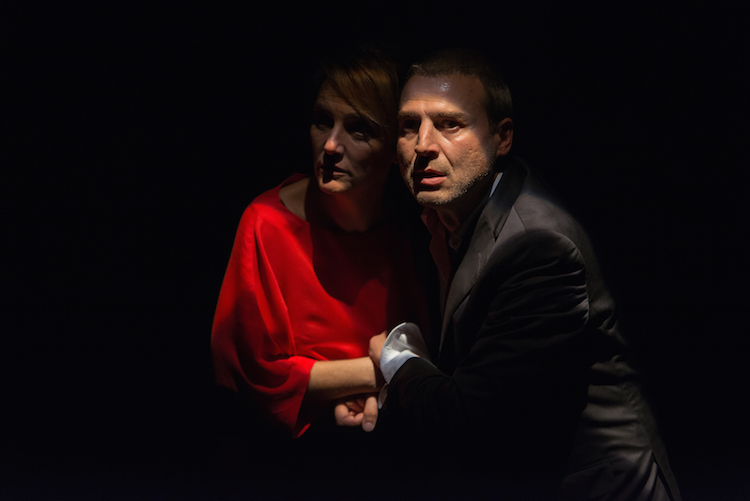
The average worker – aka the Spanish middle classes – is the focal point of a satirical stage production by the Madrid-based cooperative Teatro del Barrio. Masacre (Massacre) is an informative and incredulity-inducing theatre piece that covers some 100 years of Spanish economic history in just 80 minutes. The production features prominent Spanish actors Alberto San Juan and Marta Calvó as an anonymous pair of bank clerks who must gradually confront their unprofitable reality; caught up in a game of bluff and bluster, the couple are sold a capitalist ethic that isolates them from the world and from each other. In the meantime, a merry-go-round of high-profile profiteers from the Spanish public and private sector (also played by San Juan and Calvó) make a series of back-door agreements that benefit only themselves.
100 Years of Solitude
- We begin at the turn of the last century, a time when all the big players crawled out of the mud: landowners become banks and businesses, merging into the major corporations that we know today: Caixabank, Santander and BBVA; communications giant Movistar, petrol company Repsol, and construction firms OHL and Acciona.
- We race through a series of dodgy deals. In the 1930s Fernando María de Ybarra, (of Banco de Vizcaya – the V of BBVA), financed the coup that established the dictator Francisco Franco, while the Majorcan banker Juan March funded Italian bombers that helped flatten Guernica.
- We pay witness to the cuddly relationship between Franco and Josemaría Escrivá, the priest who initiated Opus Dei: a powerful, secretive Roman Catholic clique accused of supporting totalitarian regimes.
“When I die, order will persist! Thanks to my establishing the most important institution in Spain … the Spanish middle classes!”
- Under Franco, industry rotted in an isolationist policy more akin to abandonment than in national interests. Continuously put across in the play are two importations that Spain was indeed keen on:
1) a capitalist dream of home ownership; as José Luis Arrese, Spain’s first Minister for Housing puts it in the play: “We want a Spain of property owners, not proletarians!”
2) rampant tourism. - Spanish industry dead, the country turned to foreigners to import quick white cash. This influx of sun seekers, wilfully ignorant to the society that surrounded them, triggered a flurry of building that warted the Spanish coastline with illegal monstrosities. The play introduces the so-called ‘queen without a throne of Marbella’ Gunilla von Bismarck, a German-born countess who, with the help of real estate king José Banus, turned 1960’s Costa del Sol into the ugly sanctuary for jet setters and criminals that it is today.
“If the banks win we all win, because where there’s cash, there’s credit…!”
- Pinpointed in the production are the betrayals that took place in Spanish transition to democracy after the peaceful death of the dictator. Faced with a country in debt, capitalism was chosen as the ‘safer’ quick fix. Represented by a fictionalised conversation between banker Emilio Botín and the Prime Minister Adolfo Suarez in the 1970s, we hear: “What we’re looking at here is either to continue with capitalism or experiment with god knows what…”
- This ensured that, through the 1980s, the same companies kept hold on the reigns of Spain through grimy relationships between construction companies and bankers puffed up with the rhetoric of democracy. “Now we all have the right to borrow and buy!”
- Into the 1990s and the era of José Aznar who echoes Margaret Thatcher with the nonsensical: “Community does not exist, only the individual!”
- In 1992, during Aznar’s second term as Prime Minister of Spain, the IBEX 35 stock market index was launched and the 35 most liquid Spanish stocks traded on the Madrid Stock Exchange General Index. Its advisory committee included 78 members who had held high positions in Franco’s regime. In 2015, the national newspaper El País reported that the presidents of the 35 IBEX listed companies “earn 158 times more than the salary of an average worker.”
“Spain has progressed so much that now it’s rare to see a Spaniard on a scaffold. Now, we see them in positions higher up in the construction industry.”
- Into recent memory, and the Spanish economic crisis saw a property bubble – based on a cycle of speculation and borrowing – blow up, leaving millions unemployed, many of whom had been encouraged to leave school to make their fortunes in construction.
- To the climax of the play where a hapless contestant in a game show gives us a summation of what we’ve just experienced – ironically in the hope of winning some cash. Delivered with farcical and frightening emphasis: “Corruption for all! Corruption for all!”
“Who is going to save us now…!?”
This exhausting, entertaining, empowering production from the thankfully tireless Teatro del Barrio dismisses the term ‘Spanish middle classes” as a charade. When the economy is ‘going well’ it bobs on an expanding bubble of debt as wages stagnate and property prices rise. Meanwhile, a feudal system that has existed for centuries remains in place – cashing in when things are good, cashing in when things are bad.
